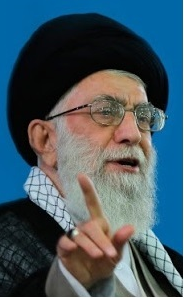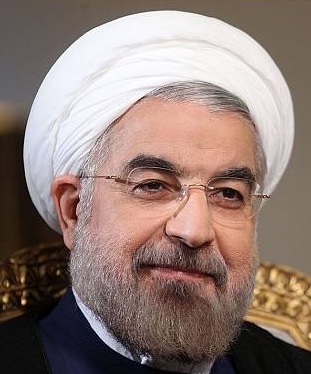Iranian leaders declared that the Islamic Republic will continue its ballistic missile program in spite of new U.S. sanctions. The sanctions, enacted on March 24, targeted two Iranian companies for supporting Iran’s ballistic missile program. Foreign Minister Mohammad Javad Zarif claimed that Tehran’s missile program “has nothing to do with nuclear weapons” and pledged to respond to the new sanctions by boosting Iran’s missile power.
The new sanctions came after Iran’s Revolutionary Guards launched several ballistic missiles on March 8 and 9. The launches appeared to be inconsistent with U.N. Security Council Resolution 2231, which bans Iran from testing ballistic missiles capable of carrying nuclear warheads. Iran, however, has argued that its missile program is defensive in nature. The following are statements from Iranian officials on Iran's ballistic missile program.
Supreme Leader Ayatollah Ali Khamenei

“The global arrogance utilizes political, economic, cultural, and military means to undermine the Islamic Republic and the nation. A reality as such should never be overlooked.”
“They use dialog, economic relations, sanctions, military threat, and other means to realize their objectives. Likewise, we should make optimum use of all these tools to fight back and defend.”
“If the Islamic establishment seeks technology and negotiations but does not have defensive power, it will have to back down in the face of any petty country that appears as a threat.”
“That they say the future of the world is one of negotiation and not one of missiles... if this is said out of ignorance, well it is ignorance. However, if this is said knowingly, then it is treason.”
“The Islamic Republic must utilize every tool…I am not opposed to political dialog, not with everyone of course. I am fine with political dialog on the level of global issues. These are times of both missiles and negotiations.”
“Negotiations should be carried out in such a way that we do not get a raw deal…That we negotiate, put things on paper, but sanctions are not removed, and trade doesn’t get going, it shows something is wrong.”
– March 30, 2016, in a speech
Islamic Republic must use all means. I support political talks in global issues, but not with everyone. Today is era of both missile & talk.
— Khamenei.ir (@khamenei_ir) March 30, 2016
If Islamic System seeks technology and negotiations, but lacks defensive power, it should withdraw vis-à-vis any tiny country’s threats. 1/2
— Khamenei.ir (@khamenei_ir) March 30, 2016
That some inside say tomorrow world is of negotiation, not world of missiles, if said unwarily, it’s unawareness; otherwise it’s treason.2/2
— Khamenei.ir (@khamenei_ir) March 30, 2016
President Hassan Rouhani
 "We will pursue any measure to boost our defense might and this is a strategic policy.”
"We will pursue any measure to boost our defense might and this is a strategic policy.”"But at the same time we should remain vigilant so that Iran's enemies do not find any excuse to take advantage of the situation."
– March 28, 2016, according to the press
Foreign Minister Mohammad Javad Zarif
Tehran has no limitations on developing its missile program “because this program has nothing to do with nuclear weapons.”
– March 26, 2016, according to the press
"Since we do not have nuclear warheads and we have undertaken not to develop them, and the international community has put in place the best mechanisms money can buy in order to make sure that we do not develop nuclear weapons... we do not design any missiles to carry things we do not have. So these missiles do not fall within the purview of (resolution) 2231 and they are not illegal.”
– March 15, 2016, according to the press
Defense Minister General Hossein Dehghan
"Americans are basically against any increase in the national power of the Islamic Republic of Iran in any dimension."
"All the missile test-firings and maneuvers are held according to pre-scheduled plans and are meant to measure the level of defensive readiness and capabilities."
– March 30, 2016, according to the press
“I am certain that the Security Council and the United Nations will not respond as our actions are neither a breach of the Joint Comprehensive Plan of Action (the July nuclear deal) nor are they against Resolution 2231."
– March 31, 2016, according to the press
Deputy Chief of Staff of the Armed Forces Brigadier General Massoud Jazayeri
"The US calculations about the Islamic Republic and the Iranian nation are fully incorrect."
"The White House should know that defense capacities and missile power, specially at the present juncture where plots and threats are galore, is among the Iranian nation's redlines and a backup for the country's national security and we don’t allow anyone to violate it."
– April 4, 2016, according to the press
Secretary of the Expediency Council Mohsen Rezaei
"Iran's missiles serve deterrent purposes and if we lose them, we will be attacked."
– March 31, 2016, according to the press
IRGC Brigadier General Amir Ali Hajizadeh
"Even if they build a wall around Iran, our missile program will not stop.”
"They are trying to frighten our officials with sanctions and invasion. This fear is our biggest threat."
– March 28, 2016, according to the press
Ambassador to the United Nations Gholam Ali Khoshroo
The missile tests were “part of efforts by the country’s Armed Forces to strengthen its legitimate defense capabilities.”
– March 26, 2016, according to the press
“Iran, as a country living in the most unstable and volatile region of the world, is fully entitled to build a credible conventional capability to deter and defend against any aggression.”
– March 25, 2016, according to the press
Click here to read more on Iran's missile launches in March.
Click here to read more on the latest U.S. sanctions on Iran's ballistic missile program.
